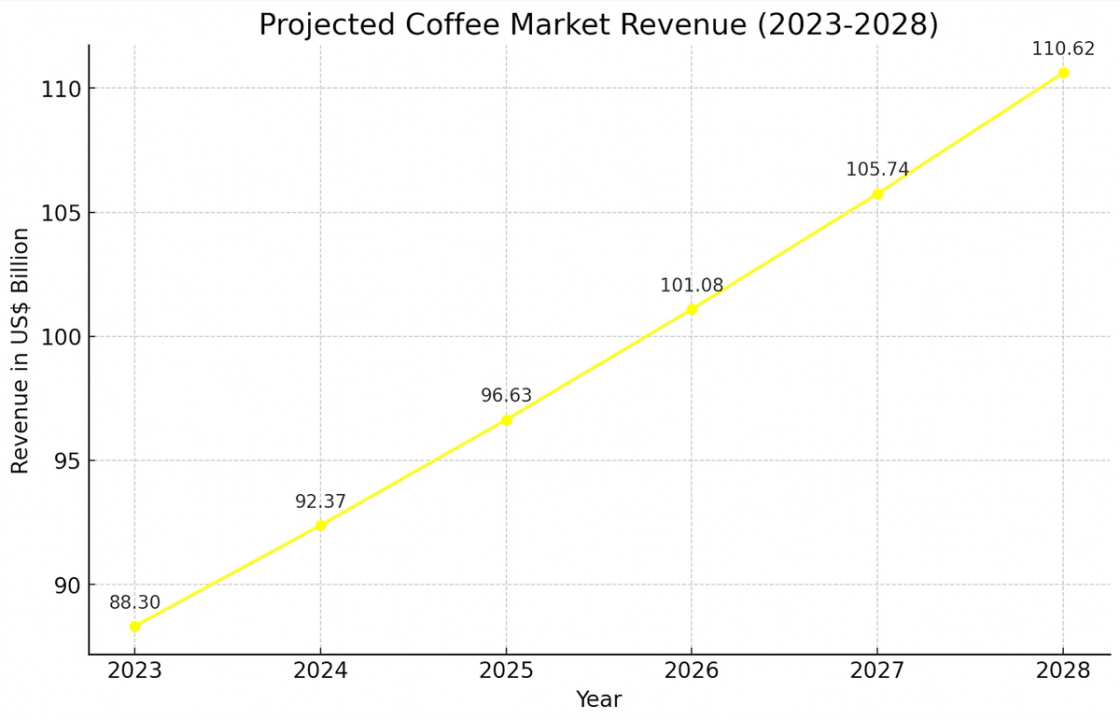Dropshipping Coffee: A Guide to Launching Your Coffee Business Online

by Eric Lam - Published 10/9/2023
by Eric Lam - Published 10/9/2023
Dropshipping is a current e-commerce business model where sellers don't keep products in stock. Instead, they purchase the product from a third-party supplier who ships it directly to the customer. Coffee, a beverage with a long-standing global demand, can be integrated into this model. To start dropshipping coffee means selling coffee products online without holding inventory, leveraging suppliers to fulfill orders. This approach capitalizes on the consistent demand for coffee while utilizing the efficient and low-risk structure of dropshipping.
What is Dropshipping?
Dropshipping is a contemporary retail model, particularly popular in the online coffee shop domain. In this model, sellers don't maintain a stock of coffee products. When a coffee lover places an order, the seller purchases the product, whether it's single origin coffee beans, custom coffee blends, or coffee related accessories, from a third-party coffee supplier. This supplier, often a wholesale coffee entity, then ships the product directly to the customer.
For businesses ready to start in the coffee industry without the burden of inventory, this means minimized risks and reduced overhead costs. Such an online coffee business approach gives sellers the flexibility to offer a diverse range of products, from private label coffee to unique coffee flavors and even coffee equipment. The emphasis is on ensuring high quality, especially when dealing with products like coffee beans, and impeccable customer service.
Moreover, this model allows sellers to cater to various coffee lovers, from those seeking the old Chicago coffee charm to those intrigued by custom labels and packaging options for their coffee bags. It's especially beneficial for those looking to sell coffee online under their own brand or even explore private label coffee dropshipping.
Essentially, whether you're looking to establish a coffee brand, an online coffee store with a vast range of coffee products, or simply want to tap into the coffee dropshipping business, dropshipping serves as an efficient model. Coffee dropshippers combine the booming e-commerce platform with the evergreen demand of coffee enthusiasts.
Coffee Culture and Its Rising Demand

Coffee transcends its role as a mere drink. For many, it's an integral part of daily rituals, a centerpiece for conversations in coffee shops, and a cultural cornerstone. As people's palates evolve, there's an increasing inclination towards artisanal brews and custom coffee flavors. This shift isn't just limited to local coffee stores or old Chicago-style brews; it's a global phenomenon.
The coffee industry is witnessing a surge in demand for private label coffee, custom label design, and unique coffee blends. Consumers are now more informed, often seeking details about coffee bag sizes, preferred coffee roast, and even the origin of their coffee beans. With platforms like Shopify, even niche coffee businesses can set up their online coffee store, offering everything from coffee mugs to coffee equipment. The emphasis today is not just on selling coffee online but providing an experience, be it through coffee merchandise, flavored coffees, or ensuring the store's coffee bags stand out with unique designs. As this culture proliferates, coffee dropshipping suppliers are also adapting, ensuring they cater to the rising demand for high-quality, diverse coffee products worldwide.
Why Dropshipping Coffee?
This business model offers several advantages. By marrying the concept of dropshipping with the global love for coffee, entrepreneurs and solopreneurs can tap into a lucrative market without the traditional hassles of retail. No need to maintain inventory or worry about unsold coffee beans.
Just choose the right coffee dropshipping suppliers, and you're set. With the increasing popularity of online coffee shops and a diverse range of coffee products available, from coffee cups to coffee equipment, this approach allows for flexibility. Also, given the trend of private label coffee and custom coffee blends, businesses can offer unique products catering to specific niches. Whether targeting coffee lovers seeking single origin brews or those drawn to flavored coffees, dropshipping allows businesses to cater to varied tastes without significant upfront investment.
Advantages of Dropshipping
- Low Initial Cost: No need to invest in inventory or a brick-and-mortar store.
- Flexible Business Model: Easily test and change products based on market demand.
The Popularity of Coffee Products
The coffee industry is expansive, encompassing more than just the beans. It includes a wide array of products, from the basic coffee beans that come in various blends and flavors to the intricate accessories that enhance the brewing experience.
Coffee mugs, custom labels, packaging options, coffee equipment, and even coffee merchandise like shirts and hats are all part of this vast market. This diversity offers businesses numerous opportunities to cater to different segments of the market.
Furthermore, the passion of coffee enthusiasts cannot be understated. These consumers, always eager for new flavors, brewing methods, and coffee-related products, drive the industry's growth. Their constant search for the "next best thing" in the coffee world means there's continuous demand and opportunity for innovation.
Selecting the Right Coffee Suppliers
Choosing the right coffee suppliers is crucial for any business in the coffee industry. The quality of the coffee you offer directly affects your brand's reputation and customer satisfaction. To guarantee top-notch quality, businesses need to be meticulous in their supplier selection process. Here are some steps to consider:
- Research and Due Diligence: Begin by researching potential coffee dropshipping suppliers or wholesale coffee suppliers. Look into their track record, reviews, and the origins of their coffee beans. Are they known for providing high-quality beans or blends?
- Sample Testing: Before finalizing a supplier, order samples. Taste the coffee, check for freshness, and assess the packaging. This step ensures that the product aligns with your brand's quality standards.
- Transparency: Ensure the supplier is transparent about their sourcing methods. Are they involved in fair trade? Do they follow sustainable practices? Information like this can also be a selling point for many modern consumers.
- Consistency: A good supplier maintains consistency in quality. Regularly check batches to ensure the coffee's standard remains unchanged over time.
- Communication: Open lines of communication with the supplier are essential. This ensures any issues are promptly addressed, and it also helps in staying updated with any changes in their offerings or processes.
There's a variety of online coffee suppliers—including Temecula Coffee Roasters, White Coffee, and Blessed Bean Coffee—that can provide white-label, private label coffee brand, or wholesale dropshipped coffee, as well as coffee-related equipment.
By meticulously selecting the right coffee suppliers and maintaining a strong relationship with them, businesses can ensure they always provide their customers with the best coffee products.
Marketing Strategies for Dropshipping Coffee
Marketing your dropshipping coffee business effectively is crucial to stand out in a competitive online landscape. First and foremost, understanding your audience is key. Are they casual morning coffee drinkers or aficionados who appreciate gourmet blends? This distinction can guide your marketing efforts and help you tailor your messaging.
Social media platforms, especially Instagram and Facebook, offer immense potential for marketing coffee products. On Instagram, aesthetics matter. High-quality visuals showcasing your coffee blends, beans, or even merchandise can engage the audience. Collaborations with influencers, especially those who resonate with the coffee culture, can help amplify your brand's reach and credibility. Facebook, on the other hand, is more community-driven. Engage with existing coffee lover groups, share your insights, and even consider creating your own community. Promote your products subtly, focusing more on building relationships and trust.
Beyond social media, content marketing and a newsletter can be a game-changer. Create informative blogs or articles about different coffee blends, brewing techniques, or the latest coffee equipment. Educate your audience, and in the process, establish your brand as a knowledgeable entity in the coffee world.
Running customized promotions based on audience preferences can also drive engagement. Whether it's introducing a new blend or offering discounts on coffee accessories, timely promotions can create buzz and incentivize purchases.
Lastly, always encourage feedback. Customer reviews, both positive and constructive, offer valuable insights. They not only act as social proof for potential customers but also provide pointers on areas of improvement.
Challenges in Coffee Dropshipping
Coffee dropshipping, while promising, presents its own set of challenges that businesses need to navigate.
A primary concern in the coffee industry is the freshness and quality of the beans. Coffee is best enjoyed when fresh, and its quality can significantly diminish over time. Therefore, it's imperative to collaborate with suppliers who prioritize the freshness of their produce. This not only involves the quality of the beans they source but also the storage conditions and the time taken from roasting to delivery. A slight delay can impact the flavor profile, making it essential to have efficient delivery systems in place. Regular checks and quality control measures can also help in ensuring that the coffee delivered is up to the mark.
Another significant challenge lies in managing the shipping logistics. The journey of a coffee product, from the time an order is placed to its final delivery at the customer's doorstep, involves multiple steps. Each of these steps needs to be meticulously managed to ensure customer satisfaction. This includes choosing reliable shipping partners, ensuring timely deliveries, providing tracking options, and handling potential shipping issues proactively. Additionally, having a robust customer support system can aid in addressing any concerns or queries that customers might have regarding their order.
In the dropshipping model, where the business doesn't handle the product physically, these challenges become even more pronounced. Hence, building strong relationships with suppliers, regular communication, and setting clear expectations can go a long way in ensuring smooth operations.
Conclusion
Venturing into the world of dropshipping coffee combines the age-old love for this aromatic beverage with the efficiency of modern e-commerce models. By tapping into the evergreen demand for coffee and utilizing effective dropshipping strategies, businesses can create a niche for themselves in this bustling market. The key lies in collaborating with reliable suppliers who prioritize quality and freshness, and in employing sharp marketing tactics that resonate with coffee enthusiasts. With these elements in place, and a passion for the coffee industry, one can truly brew a successful and thriving online coffee business.
FAQs
- Is dropshipping coffee profitable? Absolutely! With the right strategies and understanding of the market, it can be a lucrative venture.
- How do I ensure the coffee's freshness? Partner with suppliers who prioritize freshness and have efficient shipping systems.
- Can I dropship coffee accessories too? Definitely! From mugs to coffee grinders, there's a wide range of products to explore.
- How do I handle customer complaints? Prompt communication and a clear return/refund policy can effectively handle customer issues.
- Do I need to be a coffee expert to dropship coffee? While not mandatory, a passion for coffee can give you an edge in understanding the market and products.

